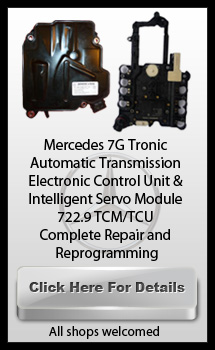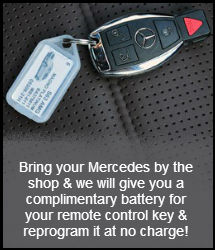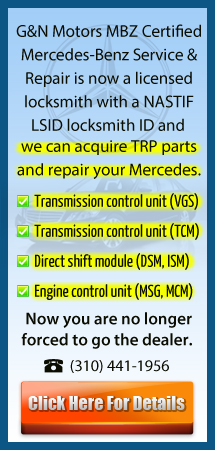Today's Mercedes Electrical Systems Are Getting More Intricate, G&N Motors Knows How To Fix And Diagnose Electrical Systems.
Electrical systems are stressing the limits of current technology. The major components of your Mercedes-Benz electrical system are explained below.
The battery is a storage device, currently 12 volts, used to start the engine and help operate the electrical accessories installed on your Mercedes-Benz.
Some batteries use a gel to replace the electrolyte for a somewhat safer battery and the use of "maintenance-free" batteries has eliminated the need for refilling the electrolyte. However, all batteries lose charging capacity over time through the loss of the electrolyte, deterioration of the plates and chemical breakdown of the connections.
Before replacing any battery due to a failure, have the battery and the car's electrical system tested for proper functioning. Replacing a dead battery only to have another a few weeks later due to a weak alternator or a parasitic drain on the system is not only frustrating but can be expensive and dangerous as well.
An average battery should last 3-5 years in average climates. The replacement battery should always have the same or higher CCA rating (cold cranking amps) as the original and be of the same or compatible "group size" to fit the battery tray and cable connections.
The alternator produces electricity used to maintain battery storage charge and to help run all the electrical accessories, including the ignition and the engine control systems. It is belt-driven by the engine and produces an alternating current (AC), which is converted internally to 12 volts direct current (DC) by the diode bridge or rectifiers.
Understanding the importance of having an operational warning light for the alternator is crucial to catching problems early. In most modern systems, the electrical current passing through the filament of the warning light is what energizes a circuit in the alternator to start charging.
This signal light is linked directly to the alternator through its terminal and can indicate problems with the alternator.
It is also important to check the fuse that controls the light circuit, as well. This fuse could be labeled differently in various cars. It could be labeled "charging", "regulator", "meters", "gauges" or "engine".
Checking out these simple circuits first can protect against unnecessary replacement of your alternator.
If it can be considered normal for warning lights to glow while a healthy alternator is running, how do you know if the alternator is really good or if there are other problems lurking around?
A thorough diagnosis is always the best route to determining whether or not the alternator is at fault.
The Starter is another major electrical component in your Mercedes-Benz electrical system. Although it is used only a few times a day, it is the single largest power user and most critical to your Mercedes-Benz operation. The starter is simply a DC motor that turns the engine crankshaft through the flywheel, starting the combustion process by creating compression within the cylinders. In plain english, that means, it gets your engine to start.
Voltage to the starter is supplied directly from the battery and is controlled by a relay and/or solenoid operated from the key switch inside your Mercedes-Benz.
Starters can be of varying types and designs - gear-reduction types for higher torque, permanent-magnet types to reduce size and weight, or just plain, old-fashioned heavy starters. But whatever the type, they all function in the same basic way.
A slow cranking engine may be a sign of a bad starter and with age, that's more and more likely. But on most cars today, it's due to low battery voltage, poor electrical connections at the battery or a failed relay or fusible link.
Most starters will easily outlast a new vehicle warranty if it's not overused, if good connections are maintained and if it's not overheated through dirt and grime buildup.
Starting your Mercedes-Benz with the major components turned off (like the AC compressor, blower motor and high-powered stereos) will greatly ease the load on the starter. In fact, most new cars have "lock out" relays that will not allow the AC compressor and alternator to turn on until after the vehicle has been started. But turning these power-hogs off before shutting off your Mercedes is always a good precaution.
Get Your Mercedes-Benz Serviced The Right Way,
Call (310) 441-1956 For A Free Diagnostic.












